
Features
Applications
Other
Wisconsin partnership cashes in on Chickity Doo Doo
February 11, 2010 by Tony Kryzanowski
Chickens do a poor job of processing nutrients, and this has created
huge headaches over the years for many egg-laying and poultry
operations when land-applying raw poultry manure because of its high
phosphorus and nitrogen content.
Chickens do a poor job of processing nutrients, and this has created huge headaches over the years for many egg-laying and poultry operations when land-applying raw poultry manure because of its high phosphorus and nitrogen content.
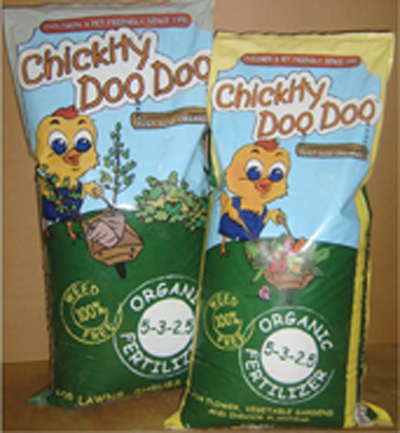 |
|
| The Chickity Doo Doo brand of organic, poultry-based fertilizer is now marketed coast to coast in the United States. Contributed photo
|
However, a couple of enterprising businessmen in Lake Mills, Wis., have recognized this as a potential value-added benefit over other sources of raw manure when it comes to producing a superior organic fertilizer.
When former teachers John Weiss and John Nortman discovered a proprietary, patented composting system that would guarantee them at least a five percent nitrogen content in the finished product, all the pieces fell into place for a poultry-based organic fertilizer that could be marketed as better than the run-of-the-mill composting products they intended to compete against. The result was the creation of a product called Chickity Doo Doo, the removal of about 21,000 tons of raw poultry manure from being land-applied, and the production of about 13,000 tons of marketable, composted product for the agriculture, retail and golf course maintenance markets.
“Coming out of the barn, we are at approximately 6 percent nitrogen on chicken layer manure as opposed to a cow, which is probably closer to 1.5 percent nitrogen, or a hog, which is maybe a little bit above that at 2 to 2.5 percent,” says Weiss. “It also comes out at a much lower moisture content as opposed to cow manure or hog manure, which makes it easier for us to compost.”
He says they are dealing with roughly 55 to 60 percent moisture content, as compared to 80 to 90 percent moisture for raw cow manure and even higher for hogs on a consistent basis, which makes their poultry manure easier to compost.
Furthermore, because the chickens need to create a quality eggshell, they are fed a very high diet of calcium, which means that the producers of Chickity Doo Doo can also guarantee at least a nine percent calcium content in their fertilizer. Research shows that calcium is another important contributor to plant health, says Weiss.
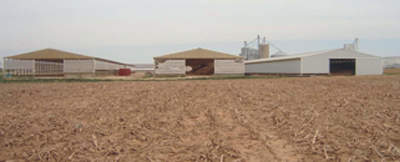 |
|
| R&J Partnership has added a major organic, poultry-based fertilizer operation to its extensive egg-laying enterprises at Lake Mills, Wis. |
However, with higher nutrient content comes a trade-off and that is an odor issue, more so on the retail side of the business than the agricultural side.
“We do, as part of our composting process, take some of the odor out,” says Weiss, “but that is part of the challenge for us. There are products that we are testing now that will be added to reduce odor and that allow us to keep our organic certification, but yes, if you retain a lot of the nitrogen and you retain a lot of the nutrients, the trade-off is odor. That is part of our next challenge.”
In 2007, R&J Partnership purchased the composting system that was operating simply as a manure management method at a massive egg-laying operation located between Madison and Milwaukee, Wis., called Creekwood Farms. The system was invented by one of the egg-laying farm’s owners. Creekwood Farms managed about one million chickens in its laying operation, and was producing a granulated and pelleted organic fertilizer product that it sold to fertilizer distributors, as well as organic and non-organic farms. Weiss describes their effort as, “dabbling a little bit on the retail side,” but he and Nortman saw much more potential in it.
“He [Creekwood’s owner] was able to compost and create the high temperature for the pathogen kill and also retain the high level of nutrients,” says Weiss. This composting technology, with its ability to produce compost with higher nitrogen content, also presented a solution to the research and development they were already conducting on an organic poultry-based fertilizer product. Up to that point, they could not achieve more than four percent nitrogen content on a consistent basis with the various conversion processes they were experimenting with.
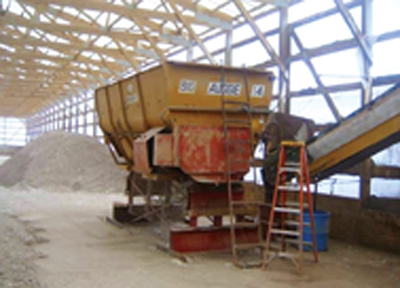 |
|
| R&J Partnership discovered and purchased a proprietary poultry manure composting system that delivers at least five percent nitrogen content on a consistent basis. |
“It was something that we had aspired towards in all of our work,” says Weiss, “and when we came across this patented system, we just thought it had too much potential to pass up.”
Since launching the Chickity Doo Doo product line in 2007, sales have doubled every year. The company hopes to achieve about $4 million in annual sales by next year. Distribution has also expanded from retail markets in the Midwest to large lawn and garden distributors on the east and west coasts. The product is registered for use in all 50 states. Sales to the retail and golf course sector have risen from eight percent to 30 percent of sales over that same period. Business is also growing in the agriculture sector, with conventional farmers seeing the value of blending the poultry-based organic fertilizer with their synthetic fertilizers.
“Our product is 30 percent carbon,” says Weiss, “so conventional farmers want to return carbon and the microbial cultures to the soil to improve the soil along with using synthetics. So, they are blending it or, in some cases, going to our product solo even though they are a conventional farm.”
This has resulted in huge demand for the poultry-based organic fertilizer to the point where R&J Partnership has run out of product at times and is in discussions with numerous other egg-laying operations that are interested in getting out of land spreading. At present there are between five and seven million egg-laying chickens in Wisconsin, which is about 10 percent the size of the industry in the nation’s largest egg-producing state, Iowa.
“What we have offered is the ability to come in and solve a problem for them,” says Weiss, “where we take the pressure off them from the standpoint of having to land-apply and having to work with state or federal agencies on nutrient management plans.”
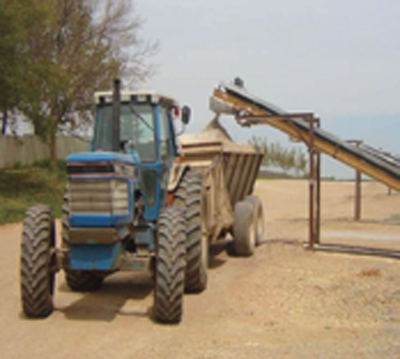 |
|
| The R&J Partnership in Wisconsin produces about 13,000 tons of marketable poultry-based organic fertilizer per year.
|
Weiss brought plenty of commercial egg-laying business experience to the organic fertilizer enterprise because, for 40 years, his father sold day-old chicks to the large layer producers in the industry. After Weiss bought his mother out in 1999, the family business evolved into a pullet supplier and now operates as a cage-free egg production business. That’s when he started investigating alternatives to land-applying poultry manure. More stringent regulations on manure land application in Wisconsin were putting that operation in jeopardy. Today, the family farm, Kettle Moraine Egg Ranch, supplies about 1000 tons of raw poultry manure annually to the Chickity Doo Doo side of the business. R&J Partnership underwent a massive expansion in April 2008, when it purchased the Creekwood Farms egg-laying operation in partnership with Daybreak Foods Inc., which now provides the remaining 20,000 tons annually of Chickity Doo Doo’s raw manure supply. At the time of purchasing the composting system from Creekwood Farms, R&J Partnership wisely acquired right-of-first-refusal on the purchase of the entire egg-laying business to ensure that they’d still have a consistent raw manure supply to support the organic fertilizer business if the egg-laying operation was ever put up for sale.
“According to Wisconsin Department of Natural Resource officials, we are the first, large concentrated animal feeding operation in the history of the state of Wisconsin that has no land application of raw manure associated with our operation,” says Weiss.
Because Creekwood Farms is a caged egg-laying operation, the manure falls onto belts that convey it to a collection site in the barn. R&J Partnership has four Knight manure spreaders to transport the manure from the egg-laying barn to the composting barns. The manure is indoors at all times, avoiding any runoff issues.
The manure is processed using the proprietary system to achieve optimal moisture content, and is normally composted over a two-week period. There are three points in the process where the temperature reaches in excess of 150 F, which works as an inoculation and helps to assuage concerns over such issues as bird flu. The compost is then processed through a Knight auger mixer, which breaks it up before it is pelletized at one of the company’s two California Pellet Mill (CPM) units.
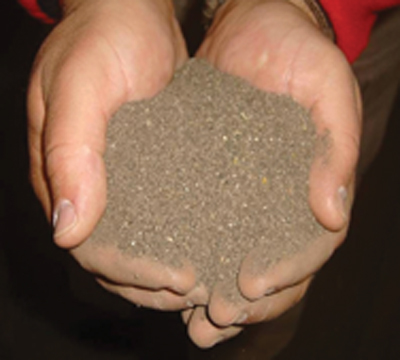 |
|
| The poultry-based organic fertilizer produced by R&J Partnership is so popular that the company is hoping that other egg-laying operations will become suppliers to the business. Contributed photos.
|
The pellets are marketed as the company’s commercial organic fertilizer for agriculture operations, but a portion is processed through a cracker crumbler that crumbles the product so that it can be applied easily with a standard lawn fertilizer spreader. This product consistency is bagged and marketed as Chickity Doo Doo, but the process also produces a fine dust. This is collected and marketed as a greens-grade organic fertilizer for golf courses.
Weiss emphasizes that what they are using is 100 percent poultry manure from egg layers, as opposed to poultry litter used in poultry-for-meat operations that is often mixed with sawdust or bedding, two materials that tend to dilute the nutrients in an organic fertilizer product. They also scrape out the manure on a daily basis as opposed to poultry-for-meat operations that typically clean out their barns every eight to nine weeks between flocks, meaning that R&J Partnership is able to keep odor to a minimum.
One of the major challenges the company faces is the issue of phosphorus content in the organic fertilizer. While Wisconsin has given organic fertilizer an exemption from its ban on fertilizers containing phosphorus, the debate continues almost on a state-by-state basis as to whether organic fertilizers should be exempt. Fighting the exemption are chemical producers who claim that this gives organic fertilizer an unfair advantage. Companies like R&J Partnership have argued that the phosphorus from the manure generated on farms still needs to go somewhere and has support from research done at the University of Wisconsin indicating that application of phosphorus in a less concentrated form as part of organic fertilizer is actually part of the overall solution to dealing with phosphorus runoff problems.
“It is important to look at what the science says and the science is on our side,” says Weiss.